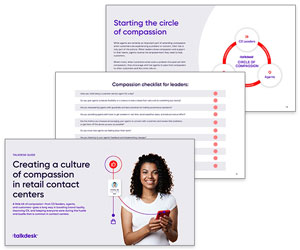Emotionally challenging calls can take their toll. Here are some ways you can help support your staff in delivering the best outcome for everyone involved.
Call listening is the best way to teach agents the soft skills they need
With no two calls ever being the same, call listening – rather than role play – is considered the best way to teach agents the soft skills they need to handle an emotional call.
This approach allows them to mirror the techniques used by their more experienced colleagues across a variety of situations.
This is especially effective if a member of the Quality Assurance team can listen in alongside the new recruit to talk through the aspects of the call that are considered best practice.
Reassuring noises are just as important as words
Making reassuring noises is just as important as using the right empathy words when handling an emotional call, as callers can’t physically see the agent nodding their head in support.
Train your agents to understand that pure silence could make the caller think that they have either dropped off the line or don’t care about their situation.
Employees should be able to express genuine sympathy from the start
It is really important that agents are able to express genuine sympathy when faced with an emotionally difficult call.

Helen Finnie
To ensure that all of their agents are capable of doing so, Agria Pet Insurance always ask interviewees about their own pets during the recruitment phase.
“Hearing interviewees talk about their own pets really helps us to know that they are passionate animal lovers who will be able to express genuine sympathy over the phone for people who have just lost their fluffy best friend,” said Helen Finnie, Customer Service Manager at Agria Pet Insurance. “Beyond that, everything else can be trained once they join us.”
Let the customer lead the call – instead of worrying about AHT targets
Agents shouldn’t have to worry about adhering to strict Average Handling Time (AHT) targets when dealing with an emotional caller. Instead, the conversation should be led by the customer and with the view that it will “take as long as it takes”.
Only when there is a natural lull in the customer’s story should the agent take back control of the conversation by asking “…And what would you like us to do for you today?”. This will support both the customer and the agent in achieving a positive outcome for the conversation.
“Some people will take the opportunity of a sympathetic ear to go into detail about what has happened and how their family is coping,” continued Helen Finnie. “It is important that the customer feels listened to. Being rushed off the phone by a rude agent will only make the situation worse.”
Give agents the time they need to recover before taking their next call
Handling emotional calls can take its toll on agents, who may be in no fit state to take the next call if they’ve just been brought to tears by a caller’s sad situation.
It is important that the management team respects that this is an inevitable part of the job and gives agents the time and space they need to recover from an emotionally challenging situation.
You need to nurture a culture where it is OK for agents to switch to “not ready” and tell their team leader they are going to clear their head in the breakout room, or get some fresh air – even if the phone lines are really busy.
Coach agents using their own call recordings
Make time for agents to listen to their own calls alongside a member of the Quality Assurance team.
This can help them to understand where they may be unintentionally making the caller feel rushed or uncared for, as well as discuss how they could generally be doing things better.
It can also allow them to examine if they were in or out of rapport, and if there were any areas where they could improve empathy.
Team leaders should expect to spend more time supporting their agents
If they are regularly handling a variety of emotionally difficult conversations, team leaders need to be prepared for their agents to be more demanding on their time.
Even though Agria Pet Insurance has a 5-week induction period for their agents taking their customer service and claims calls, team leaders still deal with a number of “top-up” queries across the week to help support their frontline team.
This is because no two calls are ever the same when it comes to handling a bereaved pet owner, and there could be months between similar situations arising.
Encourage agents to share their own experiences to help build rapport
Sharing personal information can help agents build better rapport and empathy with the caller. For example, talking about their own dog who recently passed away, or the worries that have driven them to insure their pets too.
This doesn’t need to dominate the conversation, but it can help to reassure the customer that they are talking to someone who genuinely cares about their situation.
Reassure your team that it is normal for people to react differently
New starters may be confused to hear how some callers want to talk about their bereavement all afternoon, while others can’t wait to get off the phone.
It is important to reassure them that different situations will prompt different reactions, and even the same situation may be handled completely differently depending on the timing of the phone call and the personality of the caller.
This should stop them from making snap judgements about the abrupt woman who doesn’t seem to care as much about her pet as the woman who was crying down the phone 5 minutes before.
With thanks to Helen Finnie, Customer Service Manager at Agria Pet Insurance
Do your agents handle emotional calls in your contact centre? What do you do to support them?
Put your thoughts in an email to Call Centre Helper.
Author: Megan Jones
Published On: 3rd Aug 2016 - Last modified: 10th Feb 2025
Read more about - Call Centre Management, Call Handling, Editor's Picks, Empathy, Handling Customers, Soft Skills






































if applicable we would listen in or listen to the call after . Monitor the call ask them if they are ok and feedback if they handled the call good or what areas they handled the call well and what may of worked better. Encourage them they did well so they are confident in themselves